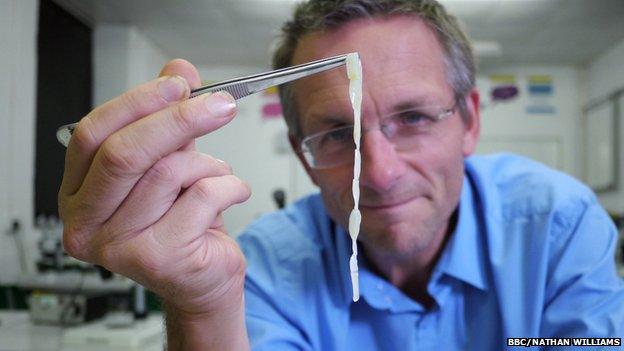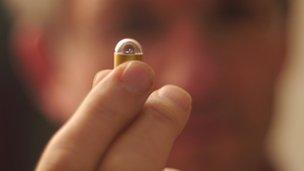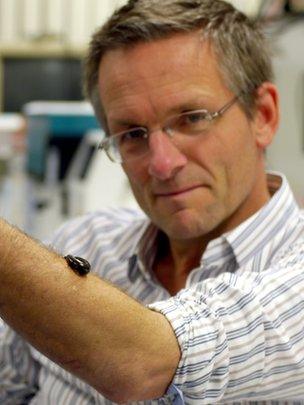Michael Mosley infests himself with tapeworms
- Published
The moment Michael Mosley saw the tapeworm living inside him for the first time
BBC TV presenter Dr Michael Mosley has infected himself with a number of parasites in an effort to understand how they affect the human body.
He swallowed tapeworm cysts, stuck a leech on his arm, and tried to infest himself with lice, in a new BBC Four documentary programme.
The worms lived in his body for several weeks - and he felt no ill effects.
The stool samples he gave while infected will be used by scientists studying signs of parasitic infection.
Dr Mosley is known for his "gonzo" medical journalism - he has previously taken "truth serum", trialled magic mushrooms, and undergone the fasting 5:2 diet.
'Delightful' discovery
In this latest film, he swallows three tapeworm cysts (larvae) which he obtained from infected cattle in Kenya.
Several weeks later, he swallows a "pill camera" which travels into his gut and broadcasts live pictures to his iPad.
He discovers three worms - "triplets" - attached to the lining of his intestine, about a metre in length.
"When I first saw the worms, I was in an Indian restaurant. I shouted out: 'Blimey! There's a tapeworm in me!' The other diners looked very surprised."

The beef tapeworm can grow more than 10m inside the human gut
"I was delighted, but at the same time, it was rather horrible.
"My wife wasn't too keen on the idea, either. But I told her not to worry - this particular tapeworm is relatively innocuous."
The beef tapeworm, Taenia saginata, is transmitted from cows to humans via infected meat.
It can grow more than 10m long in the intestine, and reproduces by passing new eggs out in the faeces.
The worm is usually asymptomatic - and Dr Mosley suffered no obvious effects, although he did put on about 1kg (2.2lbs) in weight.

Swallowing this "pill camera" let Michael Mosley see the worms inside his intestine
"It could be that the parasite increased my appetite. I ate a lot of chocolate," he explained.
"So anyone who is thinking of popping parasites as a weight-loss device should think twice."
While that idea may seem absurd, there is growing evidence that parasites may have health benefits in certain cases.
They are being considered as treatments for allergies and auto-immune diseases, as they appear to dampen the body's inflammatory responses.
Dr Mosley himself has "mild" hay fever, but was disappointed to find that the worms made no difference to his symptoms.
By documenting his experiences, he hopes to help scientists at Salford University, who are searching for early warning signs of worm infections.
"There are other tapeworms that are very nasty in humans - especially the pork tapeworm. It can get into your brain and eyes and causes cysts," he said.
'Blood everywhere'
If scientists could spot these infections early, they have a chance of treating patients. But in most cases the first clue that a person is infected comes much later - such as when they pass out eggs in their faeces.

This leech was a happy camper on Dr Mosley's arm
In the programme, which will air in February, Dr Mosley also attempted to infest himself with head lice.
"I was unsuccessful - they didn't take to me," he said.
However, a blood-sucking leech that he stuck to his forearm made itself perfectly at home.
"They told me it drank eight times its body weight in blood. There was blood everywhere when I took it off," Dr Mosley said.
The main conclusion of his experiments, he said, was that "parasites on the whole, are not crazy about me".
His other conclusion: don't try this at home.
"I wouldn't recommend buying something on the internet and infecting yourself. Heaven knows where it's been," he said.
"Some people get better, some get worse, it appears. And we never seem to hear from the people who get worse."
'Michael Mosley: Infested! Living with parasites' will be broadcast in BBC Four's natural history season, starting in February.
Related topics
- Published24 October 2013
- Published25 January 2013
- Published2 October 2013
- Published9 October 2013